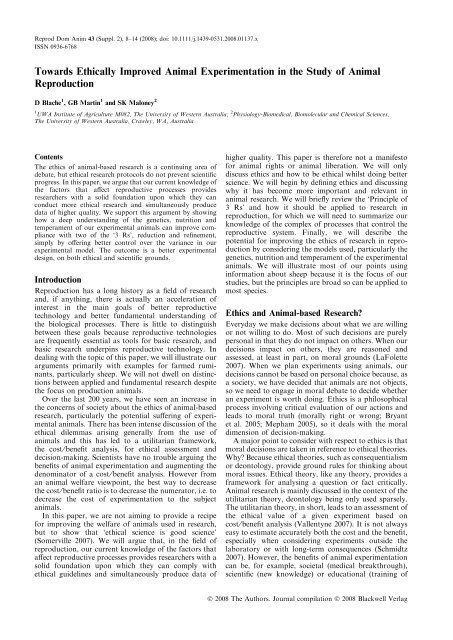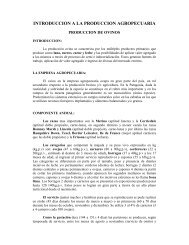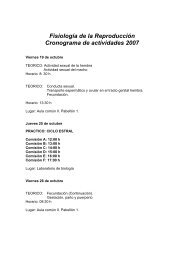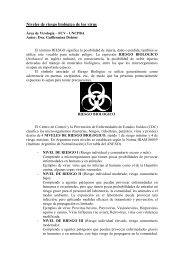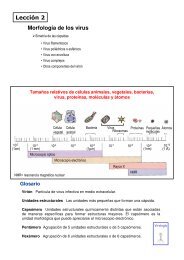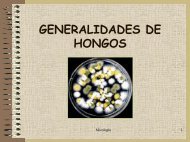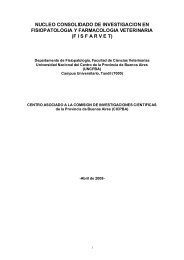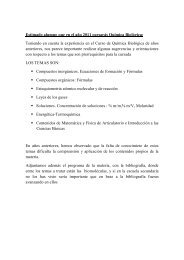Reproduction in Domestic Animals
Reproduction in Domestic Animals
Reproduction in Domestic Animals
- No tags were found...
You also want an ePaper? Increase the reach of your titles
YUMPU automatically turns print PDFs into web optimized ePapers that Google loves.
Reprod Dom Anim 43 (Suppl. 2), 8–14 (2008); doi: 10.1111/j.1439-0531.2008.01137.xISSN 0936-6768Towards Ethically Improved Animal Experimentation <strong>in</strong> the Study of Animal<strong>Reproduction</strong>D Blache 1 , GB Mart<strong>in</strong> 1 and SK Maloney 21 UWA Institute of Agriculture M082, The University of Western Australia; 2 Physiology-Biomedical, Biomolecular and Chemical Sciences,The University of Western Australia, Crawley, WA, AustraliaContentsThe ethics of animal-based research is a cont<strong>in</strong>u<strong>in</strong>g area ofdebate, but ethical research protocols do not prevent scientificprogress. In this paper, we argue that our current knowledge ofthe factors that affect reproductive processes providesresearchers with a solid foundation upon which they canconduct more ethical research and simultaneously producedata of higher quality. We support this argument by show<strong>in</strong>ghow a deep understand<strong>in</strong>g of the genetics, nutrition andtemperament of our experimental animals can improve compliancewith two of the ‘3 Rs’, reduction and ref<strong>in</strong>ement,simply by offer<strong>in</strong>g better control over the variance <strong>in</strong> ourexperimental model. The outcome is a better experimentaldesign, on both ethical and scientific grounds.Introduction<strong>Reproduction</strong> has a long history as a field of researchand, if anyth<strong>in</strong>g, there is actually an acceleration of<strong>in</strong>terest <strong>in</strong> the ma<strong>in</strong> goals of better reproductivetechnology and better fundamental understand<strong>in</strong>g ofthe biological processes. There is little to dist<strong>in</strong>guishbetween these goals because reproductive technologiesare frequently essential as tools for basic research, andbasic research underp<strong>in</strong>s reproductive technology. Indeal<strong>in</strong>g with the topic of this paper, we will illustrate ourarguments primarily with examples for farmed rum<strong>in</strong>ants,particularly sheep. We will not dwell on dist<strong>in</strong>ctionsbetween applied and fundamental research despitethe focus on production animals.Over the last 200 years, we have seen an <strong>in</strong>crease <strong>in</strong>the concerns of society about the ethics of animal-basedresearch, particularly the potential suffer<strong>in</strong>g of experimentalanimals. There has been <strong>in</strong>tense discussion of theethical dilemmas aris<strong>in</strong>g generally from the use ofanimals and this has led to a utilitarian framework,the cost ⁄ benefit analysis, for ethical assessment anddecision-mak<strong>in</strong>g. Scientists have no trouble argu<strong>in</strong>g thebenefits of animal experimentation and augment<strong>in</strong>g thedenom<strong>in</strong>ator of a cost ⁄ benefit analysis. However froman animal welfare viewpo<strong>in</strong>t, the best way to decreasethe cost ⁄ benefit ratio is to decrease the numerator, i.e. todecrease the cost of experimentation to the subjectanimals.In this paper, we are not aim<strong>in</strong>g to provide a recipefor improv<strong>in</strong>g the welfare of animals used <strong>in</strong> research,but to show that ‘ethical science is good science’(Somerville 2007). We will argue that, <strong>in</strong> the field ofreproduction, our current knowledge of the factors thataffect reproductive processes provides researchers with asolid foundation upon which they can comply withethical guidel<strong>in</strong>es and simultaneously produce data ofhigher quality. This paper is therefore not a manifestofor animal rights or animal liberation. We will onlydiscuss ethics and how to be ethical whilst do<strong>in</strong>g betterscience. We will beg<strong>in</strong> by def<strong>in</strong><strong>in</strong>g ethics and discuss<strong>in</strong>gwhy it has become more important and relevant <strong>in</strong>animal research. We will briefly review the ‘Pr<strong>in</strong>ciple of3 Rs’ and how it should be applied to research <strong>in</strong>reproduction, for which we will need to summarize ourknowledge of the complex of processes that control thereproductive system. F<strong>in</strong>ally, we will describe thepotential for improv<strong>in</strong>g the ethics of research <strong>in</strong> reproductionby consider<strong>in</strong>g the models used, particularly thegenetics, nutrition and temperament of the experimentalanimals. We will illustrate most of our po<strong>in</strong>ts us<strong>in</strong>g<strong>in</strong>formation about sheep because it is the focus of ourstudies, but the pr<strong>in</strong>ciples are broad so can be applied tomost species.Ethics and Animal-based Research?Everyday we make decisions about what we are will<strong>in</strong>gor not will<strong>in</strong>g to do. Most of such decisions are purelypersonal <strong>in</strong> that they do not impact on others. When ourdecisions impact on others, they are reasoned andassessed, at least <strong>in</strong> part, on moral grounds (LaFolette2007). When we plan experiments us<strong>in</strong>g animals, ourdecisions cannot be based on personal choice because, asa society, we have decided that animals are not objects,so we need to engage <strong>in</strong> moral debate to decide whetheran experiment is worth do<strong>in</strong>g. Ethics is a philosophicalprocess <strong>in</strong>volv<strong>in</strong>g critical evaluation of our actions andleads to moral truth (morally right or wrong; Bryantet al. 2005; Mepham 2005), so it deals with the moraldimension of decision-mak<strong>in</strong>g.A major po<strong>in</strong>t to consider with respect to ethics is thatmoral decisions are taken <strong>in</strong> reference to ethical theories.Why? Because ethical theories, such as consequentialismor deontology, provide ground rules for th<strong>in</strong>k<strong>in</strong>g aboutmoral issues. Ethical theory, like any theory, provides aframework for analys<strong>in</strong>g a question or fact critically.Animal research is ma<strong>in</strong>ly discussed <strong>in</strong> the context of theutilitarian theory, deontology be<strong>in</strong>g only used sparsely.The utilitarian theory, <strong>in</strong> short, leads to an assessment ofthe ethical value of a given experiment based oncost ⁄ benefit analysis (Vallentyne 2007). It is not alwayseasy to estimate accurately both the cost and the benefit,especially when consider<strong>in</strong>g experiments outside thelaboratory or with long-term consequences (Schmidtz2007). However, the benefits of animal experimentationcan be, for example, societal (medical breakthrough),scientific (new knowledge) or educational (tra<strong>in</strong><strong>in</strong>g ofÓ 2008 The Authors. Journal compilation Ó 2008 Blackwell Verlag


